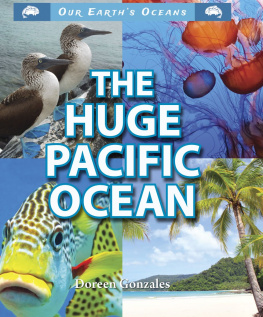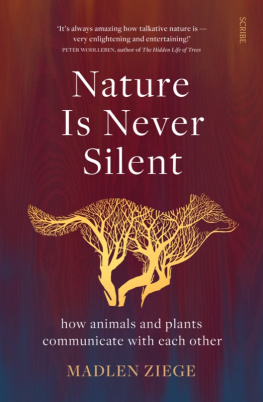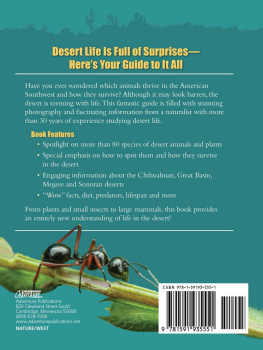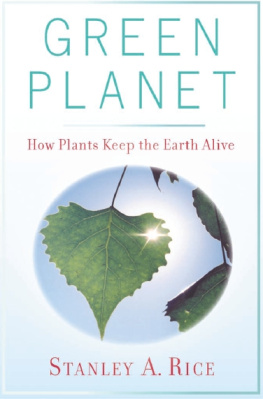
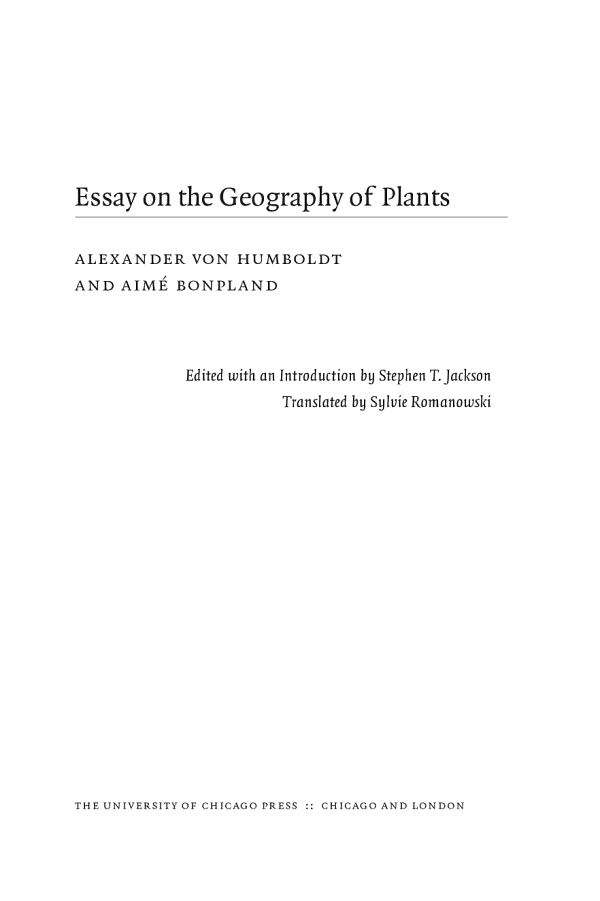
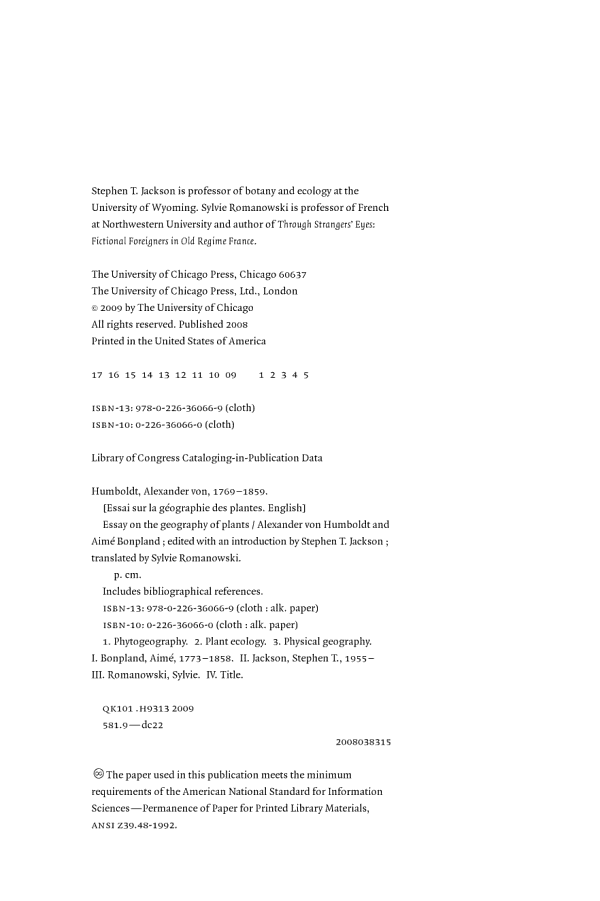
Preface
This project had its origins in a chance conversation during a Chicago-to-Paris flight in the summer of 2003. Sylvie Romanowski and I were seated next to each other, and, upon chatting, we learned that we were respectively professors of French literature and botany. I mentioned my frustration in attempting to read a recently acquired reprint volume of Humboldts Essai sur la gographie des plantes. I was not sure whether my problems had to do with archaic idioms in the document or the sad state of my French-language skills after decades of neglect. Sylvie suggested she might be able to help and asked me to send a copy to look at. Upon my return to Laramie, I sent a copy of the Essai text to Sylvie. She was intrigued, and upon seeing a facsimile of Humboldts color plate that accompanied the Essai, she developed a definitive case of the Humboldt virus.
The Humboldt virus is an easy one to catch. All it takes is a reading of part of Humboldts Personal Narrative, or an essay from his Views of Nature, or simply a perusal of the Chimborazo profile which accompanied the Essai. You are confronted with a man who was interested in nearly everything, who could speak and write authoritatively about the electrical properties of muscles, the philology of the ancient Incas, the political economy of Mexico, and the mineralogy of the Urals; who was equally comfortable conversing with Gauss, Goethe, and Gay-Lussac (not to mention Thomas Jefferson, Tsar Nicholas I, Abraham Mendelssohn-Bartholdy, an anonymous, pedantic poison-master in the upper Orinoco, or Carlos del Pino, the Guayqueria whom Humboldt enlisted as his assistant in Venezuela); who dined on ants and monkeys in the Orinoco and foie gras and caviar in Paris salons; who was passionate in his love of political freedom and his hatred of slavery; who envisioned how hundreds of point-observations of temperature, magnetism, or plant form could be assimilated to reveal global patterns; who led the funeral procession for the fallen Berlin revolutionaries of 1848 at the same time he was serving as chamberlain and confidant to the Prussian king; who was happy to do chemical experiments in a flooded Paris basement, inventory plants while climbing the slopes of Cotopaxi, make exacting astronomical measurements in a mosquito-infested jungle, or dissect electric eels with a local savant in a dusty llanos village; who, when told he must ride across the Quindiu Pass aboard a silleroa mulatto man saddled with a chairstrapped one of the chairs to his own back and insisted that he carry the sillero; who inspired the scientific career of Charles Darwin, the artistic career of Frederic Edwin Church, and the political career of Simn Bolvar; who was eulogized in America by Ingersoll, Emerson, and Agassiz (respectively an agnostic, a mystic, and a zealot); who was the subject of the dedication page of Edgar Allan Poes last major work; who spent his considerable inheritance self-funding his scientific explorations, underwriting his scientific monographs, and supporting his less fortunate colleagues; who made substantive contributions to nearly every branch of the natural and social sciences of his time; whose work laid the foundations for a dozen disciplines, ranging from geophysics to biogeography to political economy.
Resistance is pointless once you have begun to engage Humboldt. Though his personality is often remote (his Personal Narrative is anything but personal), his insatiable curiosity and intellectual power are always close at hand. Within a few months of our first meeting, Sylvie and I had agreed to work together on a complete translation of Humboldts Essai, and before the project was long underway we were both inspired to write accompanying essays.
The Essai sur la gographie des plantes, with its accompanying Tableau physique des Andes et Pays voisins, is one of Humboldts most influential works. It has long been regarded as one of the foundation texts of ecology and biogeography, but it is more than that. It is the first mature, integrated statement of Humboldts view of a unified nature, with diverse properties showing coherent patterns in space at local to global scales. The Essai (and its German equivalent, Ideen zu einer Geographie der Pflanzen) has been reprinted at various times since its first publication in 1807. But it has never appeared in an English translation.
Since the Second World War, English has emerged as the lingua franca of science. As a consequence, native-born English speakers working in the sciences no longer have to develop fluency in French, German, or other languages. In fact, scientists at universities in the United States often view foreign languages as a burden, discourage students from taking them, and even try to purge them from the required curriculum. It is an unfortunate fact that most scientists in the United States and other English-speaking nations are unable to read and appreciate Humboldts Essai.
The primary purpose of this volume, then, is to bring Humboldts Essai to an English-speaking audience at relatively low cost. But why should anyone in the early twenty-first century read a 200-year-old scientific work, however canonical? The question is obviously easy to answer for historians or humanists, but why should scientists interrupt their busy lives to read Humboldt, or any of the old masters?
Scientists have a well-deserved reputation for being focused on the here and nowthe burning questions that are at the frontier of knowledge. They tend not to be concerned with the questions and concepts of a decade ago, let alone a century. This is paradoxical, because science is inherently a historical enterprise. The body of current knowledge is built on years, decades, or centuries of previous scholarship and research, and it is subject to the same kinds of historical contingencies and artifacts as any other human endeavor. Some scientists recognize this, and acknowledge the need to step back and examine where a question or concept has come from, how it has evolved, and whether something important has been overlooked along the way. At its most fundamental level, this is good scholarship and leads to a healthy sense of humility. Furthermore, concepts tend to evolve in time, and so confusion and pointless controversy can be avoided by looking at their lineages. And occasionally, long-neglected ideas are rediscovered and brought back to life, helping to solve current puzzles or opening new avenues for discovery.
Historical examination is particularly critical for ecology, evolution, and biogeography, because these are inherently historical sciences. Obviously so, in the sense that the phenomena that they attempt to explainthe abundance and distribution of organisms across the globe, the diversity of life at local to global scales, the origin of features of organisms that fit them to their respective environment, the movement of energy and materials in space and timeall have historical components. None can be fully explained without some knowledge of history, because different processes occur at different rates, Earths environment changes through time, and system states at any given time are contingent on previous states and events.


